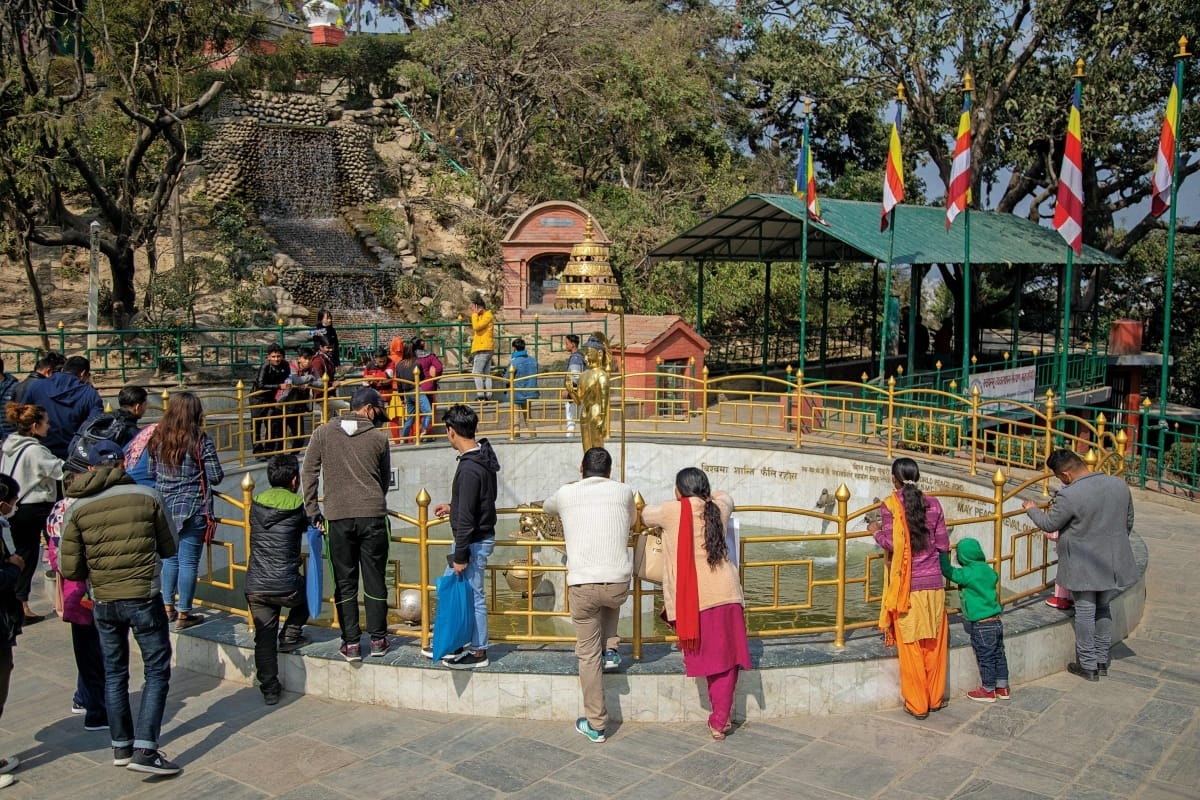The old woman and her husband stroll side by side along a long lush green by the brown muddy river as a light drizzle urges us along. They recall the time when the Trishuli rose so high fish were found amongst the cornstalks, so plentiful the villagers had to bury them when they began to stink in the high sun. The couple appear to be at peace after half a century together.
Or so it seemed after an afternoon of persistent questioning that started awkwardly and eased out into a running commentary on their spaces we shared. We started in the clean-swept concrete yard fronting a blue-beamed general store, where we were introduced to our grandmother for the day, Phulmaya Rana Magar. When her husband joined us, we followed them into the dark and dingy shack they shared with their granddaughter, watched them eat rice, potatoes and pumpkin shoots, shared a cup of thick wheat liquor, then cajoled them into taking us down to the cornfields they worked on as adhiyaari before coming out into a clearing under a massive banyan tree.
That’s the narrative of that afternoon. And out of the confusion of their lives emerged another. Widow and widower, Phulmaya Gurung and Chur Bahadur Rana met in Pokhara 50 years ago, were matched, and married. When she got back to her groom’s home in Thauwataar, a boy of ten came up to her and cried, ‘aama, aama’. She was now the unwitting mother of four boys in addition to one of her own. I was deceived, she says, slashing through a clump of grass in the fields. But it’s a narrative that seems to mean little to her. Sukha pani dukha pani eutai ta ho ni babu, she asserts. Happiness and suffering are the same? Perhaps it means much the same after so long. I may detect a faint echo of the pain of never having returned to her maita, three days away, of never having seen her parents again, and not even knowing if her sister is alive anymore. But she flattens out the drama of her life – it’s a matter of fact.
She lights a cigarette and smokes it with relish, warming to the attention of the camera. Her old man makes a face. I can’t even sit next to her when she smokes, he mutters good-naturedly. Khaane kura ta khanu paryo ni, she retorts. You gotta have what you gotta have. It’s not what I expect to hear from a 76-year-old grandmother. Teasingly, I chastise her. Then she adds, I drink jaad as well as rakshi. She tells me there’s a mela across the river in a day or two. She’s looking forward to it.
It’s hard to imagine what more she might expect from life, even if she did once. Her present has always conspired to obliterate her past. She does not even remember how to speak her native tongue. But what of it? This village of Magars and Chepangs is heading steadily towards homogenization – the construction of a suspension bridge across from Kuringtar, midway between Pokhara and Kathmandu, has only accelerated the process. The sons and daughters she raised mostly work in India and rarely visit, but a brace of grandchildren swarm around her. She laughs a lot, huskily, as she watches us place her in our picture frames.
Things might have been different. She might never have fallen sick and traveled to Pokhara, where she met Chur Bahadur. They might have never gone to Kathmandu to work in a Rana mansion in Naxal. They might have stayed in Kathmandu and marveled with the rest of us as the city of temples transformed itself in a dusty, harassed beast of burden. But Phulmaya now spends her days tending the cattle and her evenings watching the brand new television of the general store’s owner. Poverty defines her existence; I can see it in the blackened squalor of her shack, the holes in her blouse, the gauntness of her husband. We are sukumbasi, she laughs, we’re homeless and landless. She lights another cigarette and yawns. I hate to say it, but she seems as content as anybody I have ever known.
This article is excerpted from Hamra Hajurama: Our Grandmothers, a project by photo.circle. The book is available for purchase at Quixote’s Cove, Pulchowk and other book stores in Kathmandu. Please check www.photocircle.com.np for details.
Some lesser-known vegetable dishes from the southern plains
I’m not a vegetarian but I love vegetables. And whenever I get to the southern plains of Nepal, I try...








